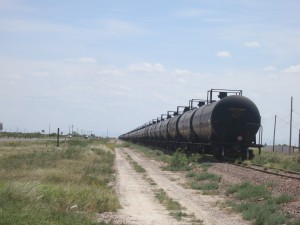5 Predictions for the Year Ahead in Energy and the Environment
There’s an old saying that it’s difficult to make predictions, especially about the future. But for the near future, University of Texas at Austin professor Michael Webber recently put together what he thinks will be the big stories in the year ahead for energy and the environment. At the annual Webber Energy Group research symposium earlier this month, Webber, Deputy Director of UT’s Energy Institute, noted that “predictions are often wrong,” like the current domestic drilling boom few saw coming, but there are some developing trends we may see more of this year.
Among his predictions:
- Exploding Trains: As more and more oil and gas is being produced in the U.S. and Canada, infrastructure for moving that fuel around is lagging behind. While pipelines take time to be built (or face political and environmental hurdles, like the Keystone XL pipeline), the oil and gas still has to get to the market. Shipping it by rail has become the preferred Plan B of the drilling companies until pipelines come on line. But moving fuels by rail can bring considerable risk when those trains go through towns and cities, like the July crude train derailment in Quebec that killed 47 people. Webber predicts more pipelines will alleviate some of the infrastructure strain pushing fuels onto rail, but it will take time. “In the meantime, we’ll use trains,” Webber said. “And those trains will derail, crash, and explode.”
- Less Flaring: More pipelines will mean less flaring, or burning off of gas, from oil wells, Webber said. Right now the Bakken Shale in North Dakota flares off 30 percent of the natural gas it produces. “There is no way the Bakken Shale gets to keep flaring” at that level, Webber said. (Texas, by comparison, flares about one percent of its natural gas.) With more pipelines, that gas could be captured and sold. Webber predicts that will happen as regulatory and political pressure increase on the industry to stop wasting gas.
- Sunny Forecast for Solar: “Solar will continue its meteoric rise,” Webber said. “When I go to Wall Street investors, they say they made a lot of money on solar last year, and they’re going to do it again this year.” In some places, solar costs just as much as traditional power, Webber noted, and is easy to build: “Even in Texas, at certain afternoon hours in the summer, solar is looking really good.”
- More Gas, Less Coal: The trend towards using more natural gas and less coal for power production will continue, Webber predicts. More transportation running on natural gas, and more gas used for home heating, displacing fuel oil in the Northeast. “[Heating oil] is very expensive,” Webber said, “Natural gas is a fourth of the cost. People will start to figure out if they put in a natural gas heater they’ll save on energy and money.”
- A Cage Match Over Exports: Will the U.S. allow its oil to be exported? Right now it doesn’t, but Webber predicts a four-way battle over the idea between “environmentalists, national security hawks, producers, and consumers.” Producers will push for exports to make more money, Webber said, while consumers will lobby against it, fearing a rise in oil prices.

Photo by Terrence Henry/StateImpact Texas
Michael Webber of UT Austin has some predictions for the year ahead.
That’s for the upcoming year, but what about longer term? For one, Webber envisions water will become more valuable. “I think water will join petroleum as one of the world’s great strategic resources,” Webber said. “Oil and gas companies will become Oil, Gas and Water companies.” Those companies handle lots of water, and are positioned well if water becomes more valuable in the coming decades.
“They’re already water companies, they just don’t sell it, they dispose of it,” Webber said. Treating that water and selling it instead could one day be lucrative if water is valued higher, which could happen in a more open water market, Webber said. “That’s a longer-term prediction, so I’ll never be wrong. I’ll just say the time hasn’t arrived yet,” he joked.
